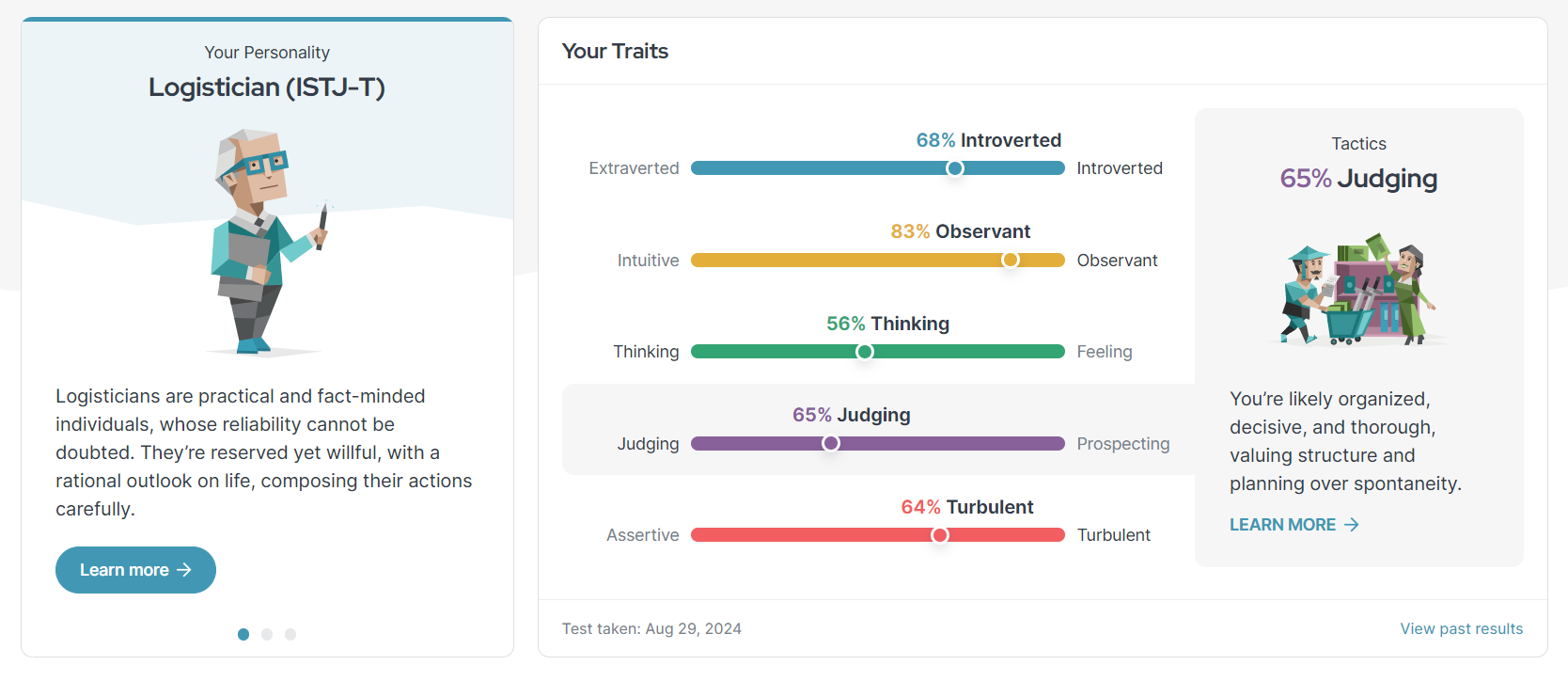There are now less than 100 days until my graduation ceremony. Today, I finally have some time to express my recent inner thoughts. They feel like a mess—difficult to organize and even harder to resonate with—which is why I rarely talk about them and instead write them down. I’ll try to make them more organized, but who cares, haha.
MBTI
A friend introduced me to the MBTI test recently, and it had been a long time since I last took one. I’m not an ardent fan of personality tests, as I believe individuals are unique and shouldn’t be labeled, but they can provide some useful insights to help you understand yourself better.

The results prompted some self-reflection. As the test indicated, I tend to respect and follow my past experiences, applying them to new situations. While proven approaches can be effective, they also limit new possibilities, creating a reliance on my comfort zone. Especially when I don’t have enough experience, what I believe to be knowledge might just be prejudice. Similar to machine learning, you can’t build a good model from scratch with a limited dataset.
The second piece of advice is to redefine perfection. Perfectionism is harmful in engineering, and the most well-known case in software development is premature optimization. Delivering an MVP (minimum viable product) is far more valuable than delivering a refined but outdated (or even meaningless) product in the real world. These unnecessary or irrational demands eventually become pressure—on both the team and myself. To be a qualified engineer, I need to adopt an engineering mindset: continuous optimization, flexibility, and fast, predictable delivery.
The last piece of advice is to stop blaming myself. In my first year of the course, a friend would often remind me to stop complaining, and while he hasn’t said that this year, the habit has lessened. I think this is a noticeable improvement, but self-blame still lingers. It’s a fixed pattern that can’t be reversed quickly. The potential impact is significant, as it undermines my confidence and makes me give up on potential opportunities. If I can’t stop blaming myself entirely, I at least need to learn how to forgive myself. I’ve never shared these thoughts with my friends because I want to maintain a relatively positive image.
Why can’t I express my true feelings openly? What am I afraid of now? I don’t know.
Farewell
Another friend once told me, No one can stay with you permanently; you will spend most of your time with yourself. This wasn’t the first time I’d heard it, but it triggered new insights. I’m not an active person, which means I don’t reach out to friends deliberately, so relationships often only last for a specific period. In other words, I don’t know how to maintain relationships, whether friendships or romantic ones. I always feel upset about parting, especially now that we’re about to graduate. I realize I’ve developed a deep dependence on these friends, as I tend to have with friends at each stage of my life. Even though I know I’ll eventually get used to it and make new friends, it still feels hard.
That’s why learning how to be alone matters. Of course, I still need good friends, but I want to stop depending on them emotionally. In my opinion, the most critical reason for this dependence is that I don’t know how to enjoy myself, especially when it comes to experiencing joy and delight alone. The lack of self-enjoyment conflicts with my naturally introverted character. To build a more stable emotional foundation, I need to:
- Find new interests outside of my comfort zone
- Mentally prepare for farewells in advance
I sincerely wish all my friends well, even if we haven’t been in touch for a long time.

Loose but Forced Schedule
I used to pretend to be putting in effort to relieve my anxiety, which led me to reduce the frequency of entertainment during the first three semesters. I’ve since made some changes, but I still feel anxious. Looking back, the time I “saved” from avoiding entertainment was actually meaningless, as it didn’t lead to valuable output. I entertained myself in an unconscious way to avoid self-blame. Now I realize that my brain has been silently resisting my commands. Perhaps I need a loose but structured schedule.
The purpose of this schedule would be to help me balance work and leisure, ensuring everything—including deadlines—stays on track. “Loose” doesn’t mean lazy; on the contrary, it means long-term thinking and flexibility. Checking actual output is more important than reviewing time spent. With the help of ChatGPT and other AI tools, I can estimate and plan better, making adjustments based on experience as I get more familiar with each task.
Thanks
I don’t know who you are, but thank you for reading. Please leave a comment if you have any thoughts on the post, the website, or the author himself.
